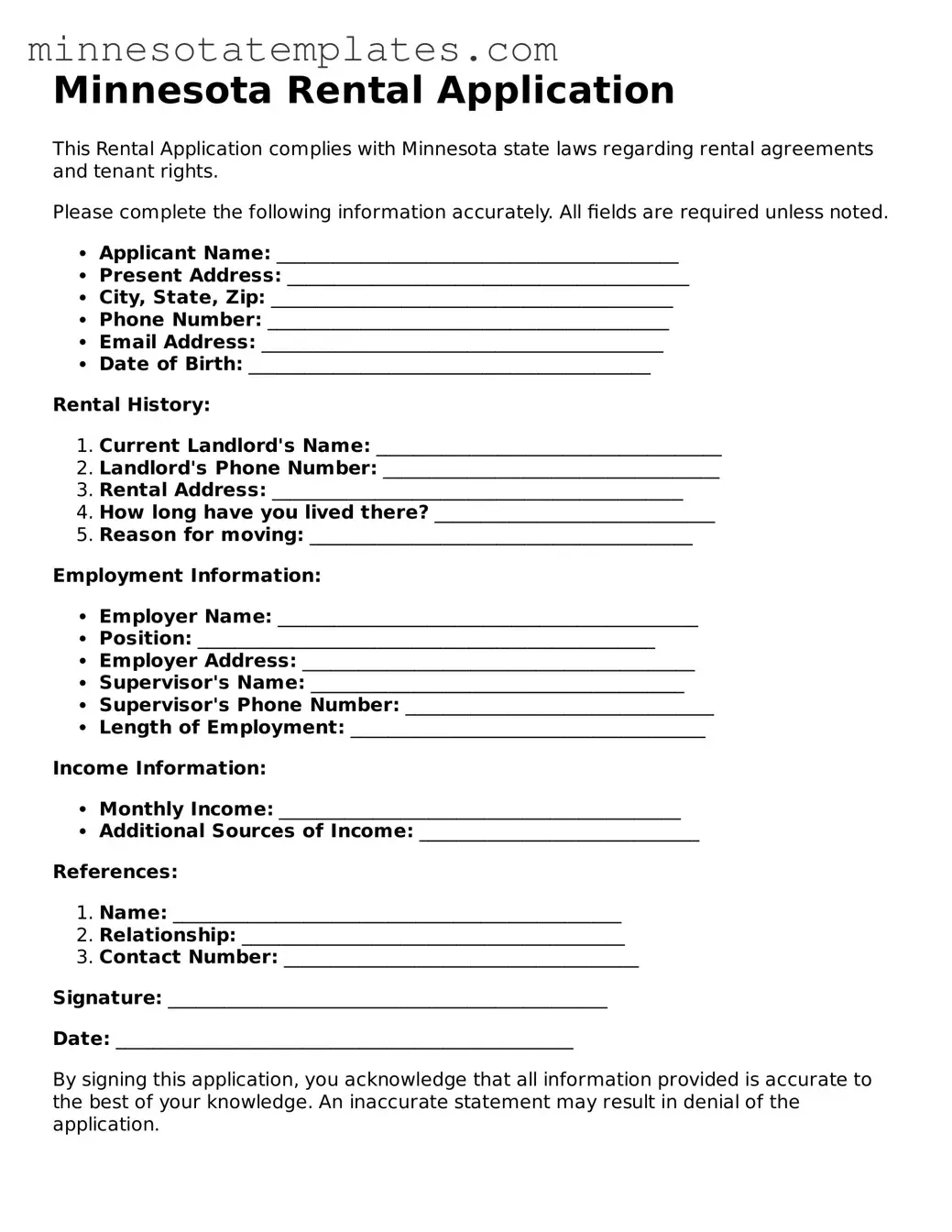Valid Rental Application Form for the State of Minnesota
When seeking a new rental property in Minnesota, prospective tenants often encounter the Minnesota Rental Application form. This essential document serves as a key tool for landlords and property managers to assess potential renters. Typically, the form requires applicants to provide personal information, including their name, contact details, and social security number. Additionally, it may ask for employment history, income verification, and references, all of which help landlords gauge the applicant's reliability and financial stability. Some versions of the form also include questions about rental history, allowing landlords to understand past tenant behavior. Furthermore, applicants might need to consent to a background check, which is a common practice in the rental process. By gathering this information, the Minnesota Rental Application form plays a crucial role in facilitating a smooth rental experience for both tenants and landlords alike.
Key takeaways
When it comes to filling out and using the Minnesota Rental Application form, understanding the key aspects can make the process smoother for both tenants and landlords. Here are some important takeaways:
- Complete Accuracy: Ensure that all information provided is accurate and up-to-date. Inaccuracies can lead to delays or rejection of your application.
- Personal Information: Be prepared to provide personal details, including your full name, contact information, and Social Security number.
- Employment History: Include your current and previous employment details. This information helps landlords assess your financial stability.
- Rental History: List your previous rental addresses. Providing references from past landlords can strengthen your application.
- Credit Check Authorization: Most landlords will require permission to conduct a credit check. Be aware that this may impact your credit score.
- Income Verification: You may need to submit proof of income, such as pay stubs or bank statements, to demonstrate your ability to pay rent.
- Application Fees: Many landlords charge a non-refundable application fee. Make sure to ask about this upfront to avoid surprises.
- Timeliness: Submit your application as soon as possible. Rental properties can be in high demand, and a prompt application can increase your chances of securing a lease.
- Review Before Submission: Always review your application for errors or missing information before submitting. A thorough check can prevent unnecessary delays.
- Follow Up: After submitting your application, it’s a good idea to follow up with the landlord or property manager to express your continued interest.
By keeping these points in mind, you can navigate the Minnesota Rental Application process with confidence and clarity.
Misconceptions
When it comes to renting a property in Minnesota, many potential tenants have questions about the rental application process. Unfortunately, several misconceptions can lead to confusion. Here are seven common myths about the Minnesota Rental Application form:
- All landlords require the same information. Each landlord or property management company may have different requirements. While many will ask for similar details, always check the specific application form for what’s needed.
- Submitting an application guarantees a rental. Many people believe that applying means they will automatically get the apartment. However, landlords review applications and select tenants based on various criteria.
- Rental applications are only about credit history. While credit checks are common, landlords also consider rental history, income verification, and sometimes personal references.
- There is no fee for submitting a rental application. Many landlords charge a non-refundable application fee to cover the cost of background checks and processing. Always clarify this before applying.
- Once you submit an application, you cannot change it. If you notice an error or want to update information, reach out to the landlord. They may allow you to correct it before making a decision.
- All applications are processed in the same timeframe. Processing times can vary widely. Factors like the landlord's workload or the number of applications can affect how quickly you hear back.
- Your application will be approved if you have a good credit score. While a good credit score is beneficial, it’s not the only factor. Landlords look at the entire picture, including income and rental history.
Understanding these misconceptions can help you navigate the rental application process more smoothly. Always read the application carefully and ask questions if something is unclear. Good luck with your search!
Other Common Minnesota Templates
Mn Purchase Agreement 2023 - Outlines the timeline for inspections and appraisals.
The Georgia Tractor Bill of Sale form is essential for documenting the sale and transfer of ownership of a tractor in Georgia. For those looking to ensure a smooth transaction while protecting the rights of both buyer and seller, utilizing the resources available at Forms Georgia can provide the necessary guidance and support in completing this important legal document.
Indemnity Hold Harmless Agreement - Parties must often initial or sign specific risk acknowledgments within the form.
Minnesota Power of Attorney Form - Power of Attorney is not just for the elderly; anyone can benefit from having one.
